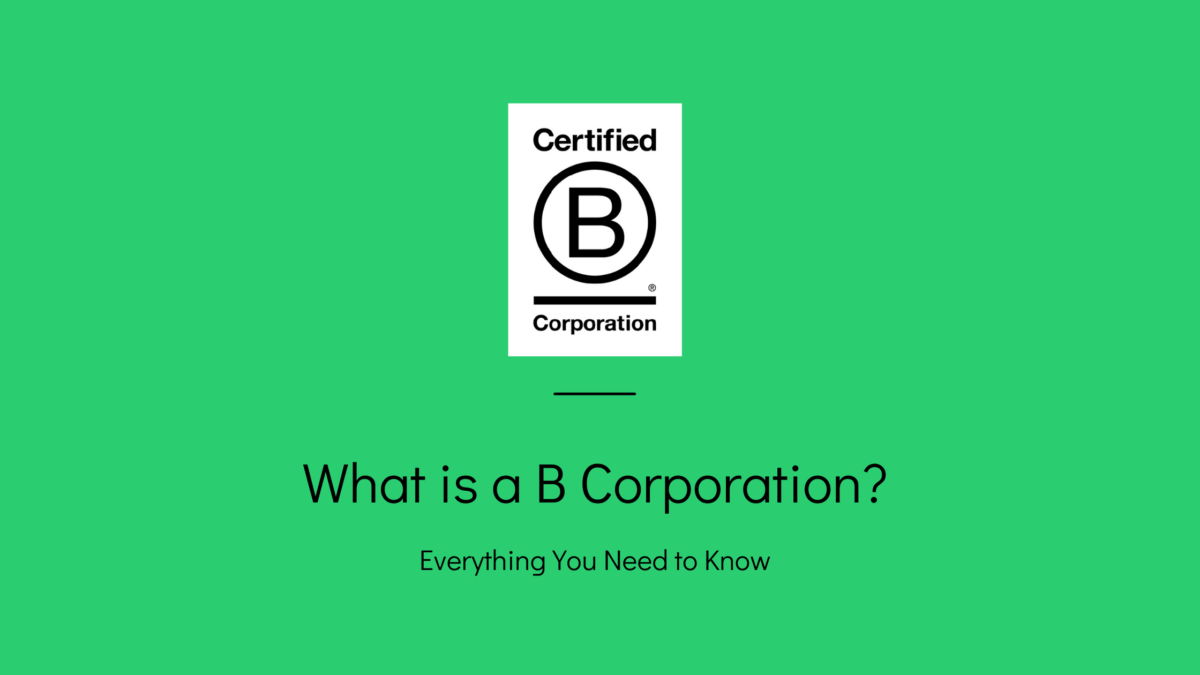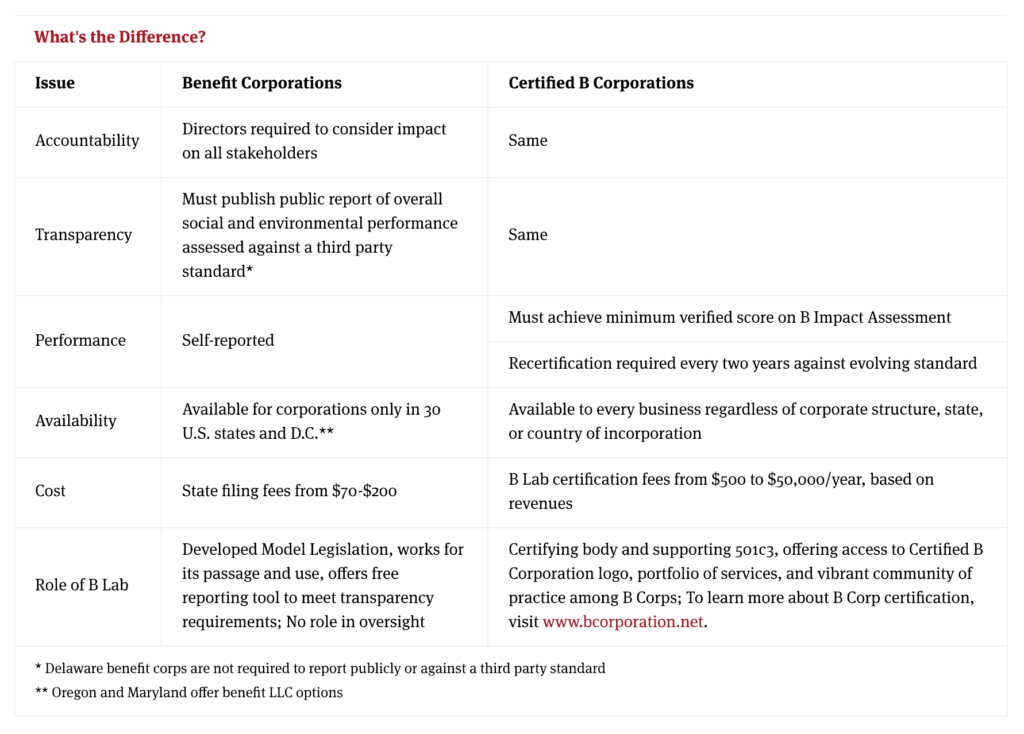
The conventional wisdom when it comes to business is that, as a business owner, you have to make a choice: you can either make money, or you can do good.
This is, however, a false dichotomy.
You don’t have to choose to either ensure your personal livelihood or to run your business according to your values. As one of my MBA instructors used to say, you can choose “both/and” – you can both make money and do good.
Now, you might be wondering:
“That sounds good, but how would it actually work for my business?”
This is where B Corps come in. Let’s take a closer at look.
What is a Certified B Corporation?
A Certified B Corporation is a company that has voluntarily met the highest standards for social and environmental performance. These standards are intentionally set high and are meant to recognize leading companies. The standards are developed independently and cover a company’s impact in key areas, including Governance, Workers, Community, Environment, and Customers.
To get certified a company must meet stringent requirements, including completing a comprehensive assessment of their company’s impacts on all stakeholders, and having their assessment verified by B Lab, the nonprofit behind the B Corp certification. They must disclose any controversial operations to B Lab and commit to transparent and public disclosure of their performance.
Unlike the traditional corporation that gives priority only to financial profitability, B Corps actually look at the triple bottom line and use the power of business to address social and environmental problems.
Inspiring, don’t you think?
The B Corp Definition
Because B Corps are still a relatively new concept – the first companies were certified in 2007 – there’s a lot of confusion about what they actually are.
Here’s the definition provided by B Lab, the nonprofit behind B Corps:
Certified B Corporations are businesses that meet the highest standards of verified social and environmental performance, public transparency, and legal accountability to balance profit and purpose. B Corps are accelerating a global culture shift to redefine success in business and build a more inclusive and sustainable economy.”
An analogy that is commonly used is that B Corp Certification is to business what Fair Trade certification is to coffee or USDA Organic certification is to milk.
In short, B Corps are companies that undergo a rigorous certification process to improve their social and environmental performance. They don’t just say that they’re good businesses or socially responsible businesses, as so many other businesses do.
They’re committed to using business as a force for good – and they’re willing to have their practices be independently vetted by a third-party and to make their results transparent. You can see the score of any B Corp on the B Corp directory.
B Corps are working to have business be a part of the solution, rather than part of the problem. Personally, I find this to be an inspiring approach, which is why I’m committed to advancing the B Corp movement.
What is B Corp Certification?
B Corp Certification is a third-party certification standard that evaluates a company’s impact on all stakeholders. Companies that choose to pursue this certification complete the B Impact Assessment (BIA) and go through a rigorous certification process.
When I first heard about B Corps back in 2008, I was immediately attracted to the concept of a rigorous framework for sustainability to distinguish the companies that were greenwashing from those that were actually doing good.
Yet there was one other element about the B Corp movement that really caught my attention because it differentiated the B Corp certification from every other sustainability certification out there:
B Corps were committing to changing their legal organizing documents to include consideration of all stakeholders.
They weren’t just paying lip service to sustainability. They were willing to make changes to the company as a legal entity to preserve their commitment to being socially and environmentally responsible.
Instead of taking the shareholder as the primary person to which they would be legally responsible, B Corps were giving primary consideration to the stakeholder.
It’s an important distinction and one that directly challenges an economic system that views a company as having one purpose and one purpose only: to make money for its shareholders.
But what exactly is the difference between a shareholder and a stakeholder?
A shareholder, as you know, is someone who owns shares in a company.
A stakeholder, by contrast, is someone who has a stake in the company, regardless of whether that individual actually own shares.
This leads to the question: who can have a stake in the company?
Anyone who is affected by the actions of that company, such as employees, members of the local community in which the business operates, or members of the community in which the business has an environmental impact.
In effect, by focusing on the stakeholder instead of the shareholder, B Corps are recognizing that they need to take responsibility for their impacts while they’re generating their profits. They can’t just focus on making money while also exploiting people and harming the environment.
B Corps make a commitment to take all of these stakeholders into account, so that their very purpose as a business goes beyond just the profit motive.
Benefit Corporation vs B Corp
This commitment to stakeholders needs to be included in company’s legal organizing documents.
Up until just a few years ago, there was no specific corporate form for a company that wanted to legally consider the impact of its activities on all stakeholders over the profits of its shareholders. Now in many states, there is.
However, this has caused confusion about Benefit Corporation vs B Corp. Are they the same thing? If not, what are the differences?
No, they are not the same thing.
Here’s the difference:
What is a B Corp?
A B Corp earns a certification from B Lab by scoring a minimum of 80 points on the B Impact Assessment.
What is a Benefit Corporation?
A Benefit Corporation adopts a corporate form that is legally recognized. This is similar to a C Corporation or S Corporation with the key difference being the consideration of all stakeholders.

It can get confusing when you consider the following:
- A company can be a Benefit Corporation but not a Certified B Corp if they use the Benefit Corporation structure but have not gone through the certification process.
- A company can be a Certified B Corp but not a Benefit Corporation if they got certified but don’t use the Benefit Corporation structure, either because it is not legally available in their state or because they are not incorporated (e.g., they’re a sole proprietor).
- A company can be both a Certified B Corp and a Benefit Corporation if they went through the certification and changed their corporate status.
Since I’m not an attorney, I reached out to one to get more information about the legal requirements. This separate post goes into more detail about becoming a Benefit Corporation.
How many B Corps are there?
B Lab keeps a running list of the total number of Certified B Corps on their home page at https://bcorporation.net/.
Where can I see a list of B Corporations?
You can find a list of B Corporations on the B Corp Directory. This directory will show you all of the companies that are certified. You can search by business name, keyword, location, or industry.
Would you like to learn more about B Corps?
Sign up for our newsletter to get regular updates about B Corps or complete the form below to speak with a B Corp consultant.